The AMD 3rd Gen Ryzen Deep Dive Review: 3700X and 3900X Raising The Bar
by Andrei Frumusanu & Gavin Bonshor on July 7, 2019 9:00 AM EST** = Old results marked were performed with the original BIOS & boost behaviour as published on 7/7.
Benchmarking Performance: CPU Encoding Tests
With the rise of streaming, vlogs, and video content as a whole, encoding and transcoding tests are becoming ever more important. Not only are more home users and gamers needing to convert video files into something more manageable, for streaming or archival purposes, but the servers that manage the output also manage around data and log files with compression and decompression. Our encoding tasks are focused around these important scenarios, with input from the community for the best implementation of real-world testing.
All of our benchmark results can also be found in our benchmark engine, Bench.
Handbrake 1.1.0: Streaming and Archival Video Transcoding
A popular open source tool, Handbrake is the anything-to-anything video conversion software that a number of people use as a reference point. The danger is always on version numbers and optimization, for example the latest versions of the software can take advantage of AVX-512 and OpenCL to accelerate certain types of transcoding and algorithms. The version we use here is a pure CPU play, with common transcoding variations.
We have split Handbrake up into several tests, using a Logitech C920 1080p60 native webcam recording (essentially a streamer recording), and convert them into two types of streaming formats and one for archival. The output settings used are:
- 720p60 at 6000 kbps constant bit rate, fast setting, high profile
- 1080p60 at 3500 kbps constant bit rate, faster setting, main profile
- 1080p60 HEVC at 3500 kbps variable bit rate, fast setting, main profile
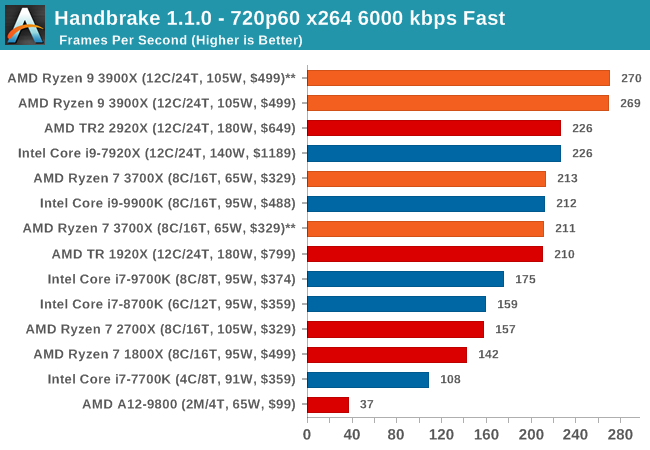
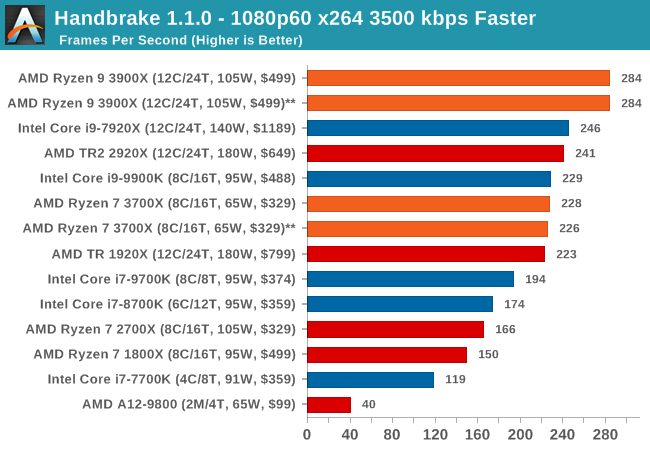
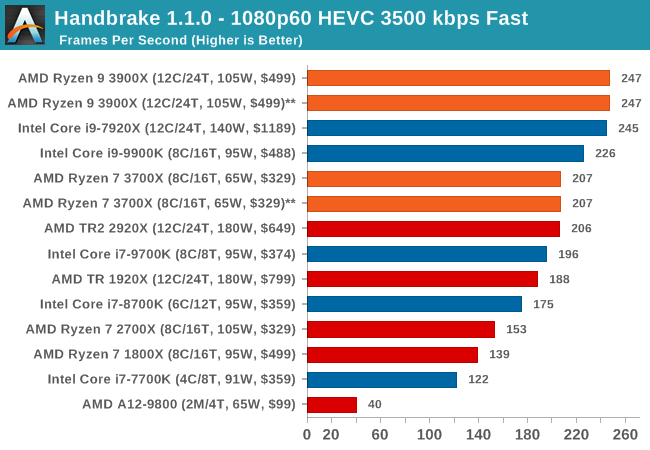
7-zip v1805: Popular Open-Source Encoding Engine
Out of our compression/decompression tool tests, 7-zip is the most requested and comes with a built-in benchmark. For our test suite, we’ve pulled the latest version of the software and we run the benchmark from the command line, reporting the compression, decompression, and a combined score.
It is noted in this benchmark that the latest multi-die processors have very bi-modal performance between compression and decompression, performing well in one and badly in the other. There are also discussions around how the Windows Scheduler is implementing every thread. As we get more results, it will be interesting to see how this plays out.
(Please note, if you plan to share the Compression graph, we'd appreciate it if you could please include the Decompression graph as well. Otherwise you’re only presenting half of the picture)
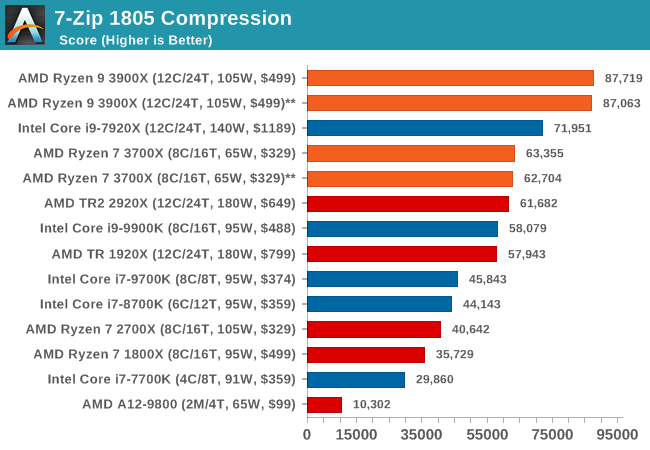
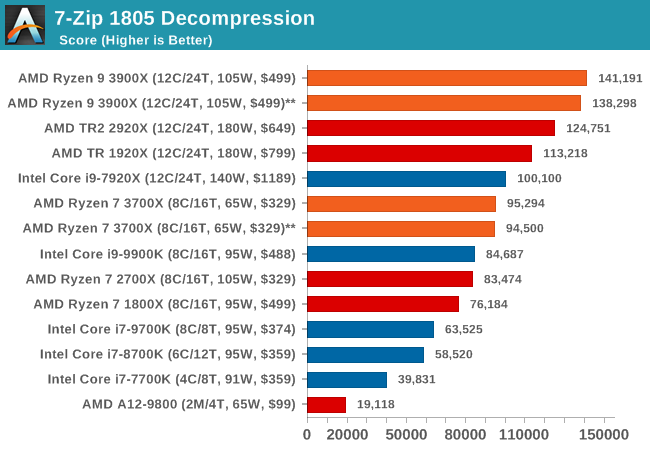
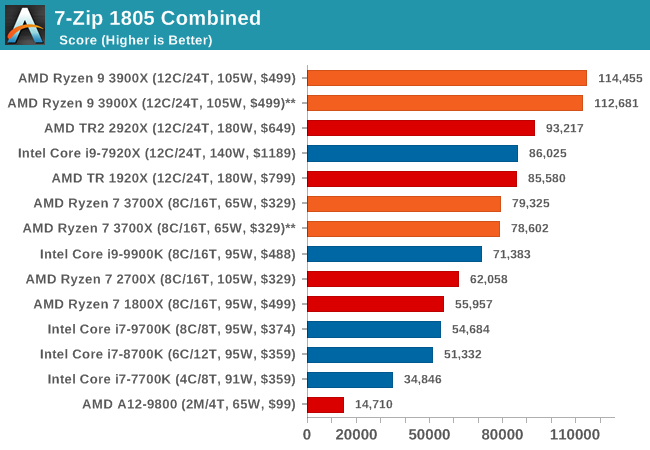
WinRAR 5.60b3: Archiving Tool
My compression tool of choice is often WinRAR, having been one of the first tools a number of my generation used over two decades ago. The interface has not changed much, although the integration with Windows right click commands is always a plus. It has no in-built test, so we run a compression over a set directory containing over thirty 60-second video files and 2000 small web-based files at a normal compression rate.
WinRAR is variable threaded but also susceptible to caching, so in our test we run it 10 times and take the average of the last five, leaving the test purely for raw CPU compute performance.
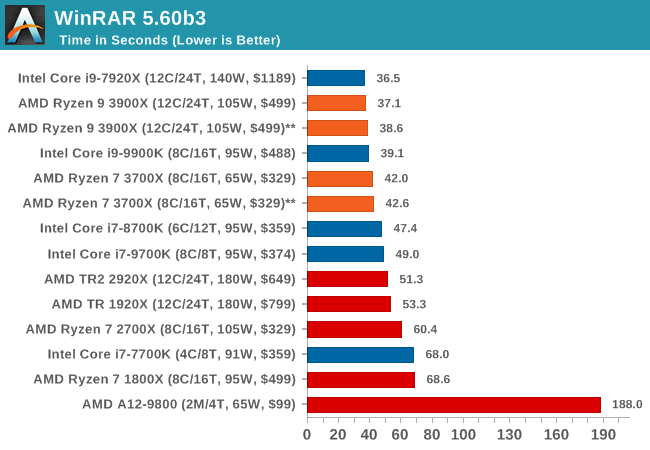
AES Encryption: File Security
A number of platforms, particularly mobile devices, are now offering encryption by default with file systems in order to protect the contents. Windows based devices have these options as well, often applied by BitLocker or third-party software. In our AES encryption test, we used the discontinued TrueCrypt for its built-in benchmark, which tests several encryption algorithms directly in memory.
The data we take for this test is the combined AES encrypt/decrypt performance, measured in gigabytes per second. The software does use AES commands for processors that offer hardware selection, however not AVX-512.
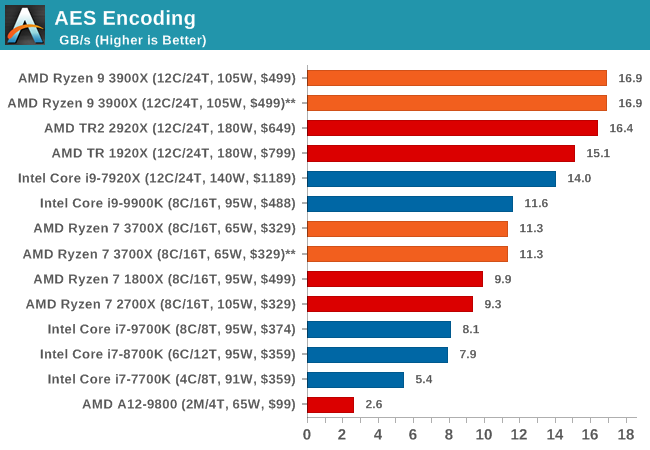










447 Comments
View All Comments
Korguz - Monday, July 8, 2019 - link
huh ???mkozakewich - Saturday, July 13, 2019 - link
"...as unfortunately the timing didn’t work out."You should increase his voltage a little and reboot, that might help.
Meteor2 - Monday, July 15, 2019 - link
It's hard to get one's head around this, but basically: *all* the Intel benchmarks *do not* include the security patches for the MDS-class flaws. The 9000 and 8000 series tests do include the OS-side Spectre fixes, but that's it. No OS-fixes for other CPUs, and no motherboard firmware fixes for any Intel CPUsAt the very least, all the Intel CPUs should be retested on Windows 10 1903 which has the OS-side MDS fixes.
Most if not all the motherboards used for the Intel reviews can also have their firmware upgraded to fix Spectre and most times MDS flaws. Do it.
This is sensible and reasonable to do: no sensible and reasonable user would leave their OS vulnerable. Maybe the motherboard, because it's a bit scary to do, but as that can be patched, it should be by reviewers.
This would result in all the Intel scores being lower. We don't know by how much without this process actually being done. But until it is, the Intel results, and thus the review itself, are invalid.
While you're at it Anandtech, each year buy the latest $999 GPU for CPU testing. Consider it a cost of doing business. Letting the GPU bottleneck the CPU on most game resolutions benchmarked is pointless.
plonk420 - Sunday, July 7, 2019 - link
mountain time zone, best time zone... 7am 7/7!exactopposite - Sunday, July 7, 2019 - link
Been waiting on this one for a long timeEris_Floralia - Sunday, July 7, 2019 - link
It's really nice to see Andrei starting to take part in desktop processor reviews and Gavin Bonshor's hardwork!mjz_5 - Sunday, July 7, 2019 - link
Intel gets 5% better FPS In games is really not a win. I’ll consider that a tie. In multiple applications AMD gets 20% more performance. That’s a win!!Dragonstongue - Sunday, July 7, 2019 - link
hopefully Anal lists :P see how much a "win" the Ryzen 3k / x5xx / Navi truly are, not only to get AMD margins even higher but to take more market share from Intel and "stagnate" Nvidia's needing to "up the price" to make more $$$$$$ when AMD "seems" to be making "as much if not more" selling a small amount less per unit (keep in mind, AMD is next Playstation and Xbox which are 99/9% likely to be using the same silicon, so, AMD take a "small hit" to get as many Ryzen gen 3 and Navi "in the world" which drums up market/mindshare which is extremely important for any business, at this stage in the game is VITAL for AMD.sor - Sunday, July 7, 2019 - link
I’m honestly wondering what the point is of the gaming benchmarks for CPU tests anymore.It seems like the game is either so easy to render that we are comparing values in the hundreds of FPS, or they’re so hard to render that it’s completely GPU dependent and the graph is flat for all CPUs.
In the vast majority of tests here one would have an identical experience with any of the top four CPUs tested.
Targon - Monday, July 8, 2019 - link
Game engines are starting to use more cores, and at lower resolutions(which do not stress the video card all that much) will show improvements/benefits of using one CPU or even platform over another. In this review, due to the RAM being used, the gaming benchmarks are almost invalid(DDR4-3200 CL16), since moving to CL14 RAM would potentially eliminate any advantage Intel has in these benchmarks.